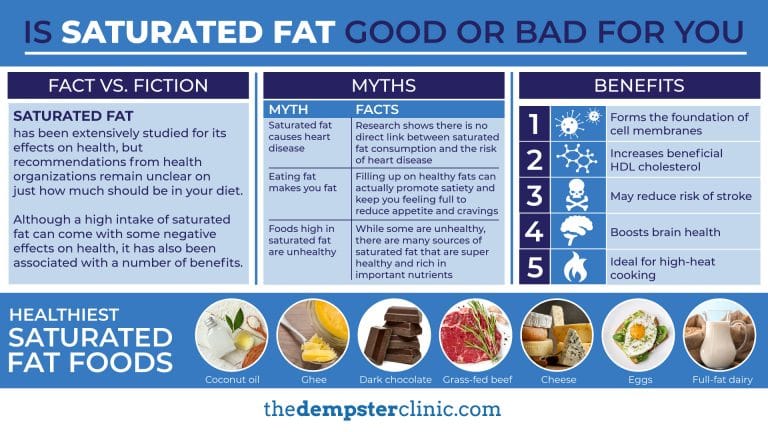Our relationship with fat over the years has been a complicated affair. We’ve often been told we can’t live with them – but there’s the other “can’t live without them” camp that causes the most confusion. The more scientists discover about fats, the more complex the relationship becomes. Ever-changing news on fats — which ones are good and which ones are bad — makes it a challenge to figure out what’s healthy for active people and what’s not. Some people try to eliminate fats from their diet altogether. Truthfully, that’s not the answer and likely the worse thing you could do.. According to research published in the prestigious New England Journal of Medicine, those eating GOOD fats are bound to live a longer and higher quality of life than those sticking to a low fat diet. Are you getting enough fat? If you’re sick of trying tasteless low-fat recipes with some of your favorite foods, you may be relieved to learn that our bodies need nutritious and fatty foods as an essential part of our diet.
To find out why, let’s start with a quick summary of the basic types of fat:
- Saturated: These are the fats we often love but have been taught that we should hate. They’re mainly found in animal products including dairy products and eggs. They are also found in some vegetable oils such as coconut and palm. These fats are usually solid at room temperature and get even harder when chilled. Despite what we’ve been told over the years, healthy versions of saturated fats DO exist and can be what I refer to as ‘game changers’ to help your health. Non-hydrogenated Coconut oil is one example… The benefits of this health promoting fat are enormous. From anti-viral and anti-bacterial benefits, all the way to helping people LOSE fat are just to name a few. As a general rule, try to keep the amount of saturated fat via animal products to a minimum (with butter being the exception).

- Monounsaturated: These fats are all-stars. They’re found in almond, peanut, sesame, canola and olive oils and avocados. Monounsaturated fats, especially olive oil, actually help decrease blood cholesterol levels. These fats usually harden at cold temperatures or become cloudy when refrigerated
- Polyunsaturated: These fats should be consumed in moderation at most. They’re found in corn, safflower, sunflower and soybean oils as well as in walnuts, pecans and hazelnuts. Polyunsaturated fats have a long history of being healthy for the heart, but these should not be heated or they can become damaging to the body creating oxidative damage and inflammation. These fats are liquid at room temperature and stay liquid when chilled. But be careful in storing them: polyunsaturated oils go rancid more easily than other oils, so keep them refrigerated
- Trans fatty acids: These fats, found in products such as margarine, french fries, potato chips, and most packaged baked goods. These fats are artificial and made through the process of hydrogenation — converting polyunsaturated oils into saturated fat. They are harmful substances that can increase cholesterol levels as much as saturated fats do. Trans fatty acids are also found in processed foods such as prepared salads and anything else made with hydrogenated oils. Avoid these at all cost if you want to reduce your risk of chronic illness.
- Essential fatty acids: EFAs are an enormously healthy group of fats — and since your body doesn’t make them naturally, you must get them from your diet. Omega-3 fatty acids are found in fish and flaxseed oils. Omega-6 fatty acids are found in beans, nuts, seeds and some vegetable oils including flaxseed, corn, soybean and safflower. In either case, the benefits are immeasurable: EFAs are important for the regulation of cholesterol production, hormonal balance and immune function. They’re necessary for healthy skin, hair, nails, mucous membranes, nerves and arteries. An inadequate amount of EFAs can contribute to skin and menstrual disorders, diarrhea and weak nails. EFAs have also been proven to guard against heart disease, cancer and arthritis. It is important to recognize that the majority of North Americans have not enough Omega 3’s and too many Omega 6’s – creating an imbalanced ratio between the two. As a result, I rarely recommend supplementing with additional Omega 6’s but focus on increasing getting more Omega 3’s into our bodies via food and supplements.
Nutritionally essential
High-fat diets have been implicated in the past to everything from cardiovascular disease to obesity, from diabetes to cancer. Quality fats and oils, however, are nutritionally essential. I highly recommend to disregard the archaic knowledge that a low fat diet is healthy, and be sure to add loads of healthy fats to your diet daily. In fact, recent research show all cause mortality is REDUCED BY 30% when consuming 1 liter of high quality olive oil per week (see study). In addition, additional research shows that all cause mortality is reduced by 20% when adding 1 handful of nuts to your diet daily (see study). These are significant statistics.
Fatty acids that are necessary for synthesizing hormones, making fat-soluble vitamins available to the body, keeping our brain sharp and healthy, and maintaining the flexibility of cell membranes. Scientists now know that if you don’t get enough good fats in your diet, your body will store fat in order to perform its daily functions. So, if you’re trying to lose weight, maintaining a low-fat or fat-free diet can actually defeat the purpose: EFAs are necessary to ensure normal burning of stored fat by muscle tissue. They also help the body burn calories more efficiently.
In addition, too little fat and infants do not thrive, children do not grow and everyone — regardless of age — is unable to absorb and use fat-soluble vitamins that smooth the skin, protect the vision, boost the immune system and keep reproductive organs functioning. The ideal amount: 30% of your total daily calories should come from HEALTHY sources of fat.
Healthy fat choices
Now that you know more about the difference between good fats and bad ones, the rest is common sense. Choose avocados over potato chips. By eating a diet high in vegetables, fruits, grains and beans, you’ll automatically tend toward the healthiest ratio of fats in your diet. If you’re going to eat animal products, eat mostly fish, seafood, skinless poultry and small portions of beef. Stick to the monounsaturated and polyunsaturated varieties and choose ones that are unrefined and cold-pressed. To get your EFAs, use flaxseed oil for salad dressing, or drizzle some lightly on steamed vegetables. Fish oils offer the highest dose of EPA and DHA, critical Omega 3’s for maintaining optimal health and prevention of most chronic diseases facing developed nations today.
When it comes to cooking, be aware that different oils respond better to different temperatures. Some have lower smoking points and are appropriate for cooking.Some have unusual flavors and aren’t appropriate for baking. Some experts advise to leave cooking oils out altogether since heating oils create harmful biproducts. The solution: cook foods in small amounts of water, and add oil after cooking. Otherwise, follow these guidelines for best results:
- Deep frying (if you must at all – highly advised to avoid): sesame, peanut and almond
- Stir frying, wok cooking (low heat): coconut, olive, peanut, safflower, sesame and sunflower
- Baking: avocado, almond, coconut, safflower, sunflower, walnut
- Low-heat cooking: sunflower, safflower, pumpkin seed and olive, grapeseed
Yours in good health,
Dr. J. Dempster, ND


